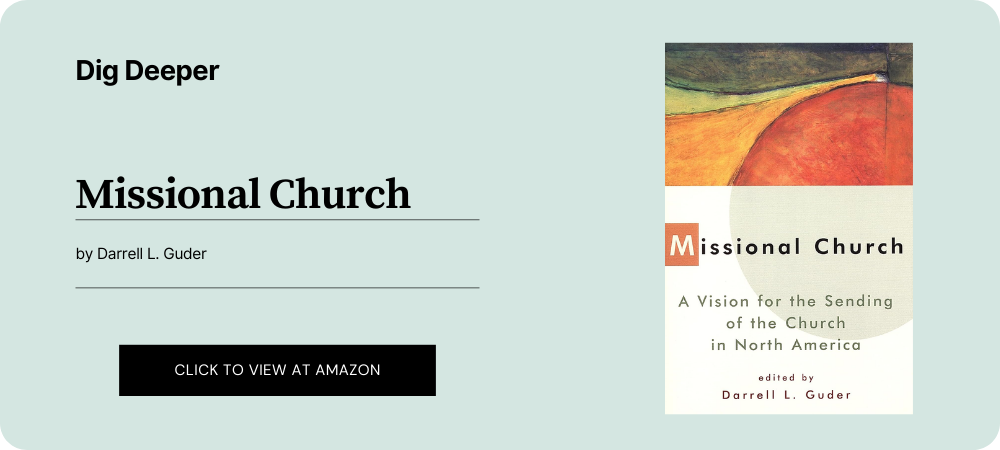Language matters, but language without substance is just rhetoric.
The last two decades in church ministry have seen an impressive shift in the way we speak about the mission of the church. We’ve adopted a language of multiplication. And with this new language of multiplication comes a focus past the walls of the individual, local church. Truthfully, many pastors and ministry leaders are realizing that no single church can reach a city. Of course, if the mission is bigger than our local church, then we need language that communicates broader work.
Enter the Kingdom of God. The Bible is replete with language about the kingdom. It is the good news of the kingdom that Jesus came to preach (Mark 1:14, 1:38). It is the kingdom that, like a pearl of great price, is worth selling everything we have in order to obtain (Matthew 13). And it is the kingdom of God that will ultimately break into fullness with the return of Christ, destroying death and sin and ushering in a new creation (Revelation 11:15).
Today, it is common to hear people speaking of kingdom ministry, of advancing the kingdom, growing the kingdom, or building the kingdom. Kingdom language has become shorthand for mission language as it relates to those efforts that advance more than our one, local church. In fact, efforts at congregational growth are even said to be at odds with kingdom ministry when those efforts are more concerned about growing the church congregation than advancing the mission of God’s global church. “Are you building your kingdom or God’s kingdom?” people may ask.
What exactly is a Kingdom perspective?
Having a kingdom perspective usually means being more concerned about God’s global mission than the material success (be it in attendance, finances, or buildings) of any one congregation, and that’s a good thing. Curiously, however, the Bible rarely uses verbs like spread, advance, extend, or build when it talks about the Kingdom. As Darrell Guder points out in his book, Missional Church, “The verbs to build and to extend are not found in the New Testament’s grammar for the reign of God. The announcement of God’s reign nowhere includes an invitation to go out and build it, nor to extend it. These are not New Testament ways of speaking about the reign of God.”1 Regardless of your thoughts on Guder’s overall philosophy of ministry, his note concerning the biblical language used to reference the kingdom is significant. Guder goes on to note that speaking of the mission as kingdom building or kingdom extending often crafts the mission as some social project or sales pitch.2 Instead, he notes, the verbs receive and enter are often attached to the kingdom. The kingdom of God is not a project at the center of the church’s mission waiting to be built; it is a gift, given by God that we may receive, enter, and to which we may invite others.
When it comes to language about the kingdom growing, we frequently turn to the parables found in Matthew 13, especially the parable of the mustard seed and the parable of the leaven (Mt. 13:31-33). However, in his seminal work on the kingdom of God, George Ladd refutes the notion that these parables discuss the gradual growth or building of the kingdom at all. Instead, Ladd claims these parables showcase the mystery of the kingdom, which is already inaugurated in Christ and present in a seemingly small historical movement but will one day be made manifest in his eschatological return and revealed to be all-encompassing of the cosmos.3 What was so small in its inception will one day be too large to ignore, and the means through which this occurs is a divine mystery. That’s the growth of the kingdom.
Ladd writes, “The Kingdom of God is the redemptive reign of God dynamically active to establish his rule among human beings, and that this Kingdom, which will appear as an apocalyptic act at the end of the age, has already come into human history in the person and mission of Jesus to overcome evil, to deliver people from its power, and to bring them into the blessings of God’s reign.”4 It is divine initiative at work in the affairs of men. That’s not to say we do not labor for it by obedience to the mission Christ has given his church. Surely we do. But, we do not orchestrate its development, we do not permeate society with it, and we do not ensure its success. Christ does.
So, we long for the kingdom. We pray for the kingdom to come (Matthew 6:10). We receive (Mark 10:15, Hebrews 12:28), inherit (1 Corinthians 6:09, 1 Peter 1:4, James 2:5), enter (Matthew 5:20, 19:23, 2 Peter 1:11), seek (Matthew 6:33), await in preparation (Matthew 25:13), and invite (Luke 14:23) people into the kingdom.
“But the word of God increased and multiplied.”
If building, growing, and advancing the kingdom is perhaps not the most biblical language to use when referring to our mission and ministry, then what is? In order to give words to the progress of our mission, we need look no further than the book of Acts. Acts does not tell us the kingdom grows, but it does speak of a certain kind of growth directly tied to the mission of the church: the growth of the gospel.
Throughout the books of Acts, Luke pauses periodically in his narrative to provide a regular check on the state of the mission as it progresses first in Jerusalem, to Judea and Samaria, and then to the ends of the earth across the Mediterranean (Acts 1:8). These summary statements may be the clearest examples of biblical success metrics in the mission and ministry of the first century church, and what they record for us is striking. Luke seems to be obsessed with the growth of the Word of God. Over and over again (Acts 6:7, 12:24, 13:49, 19:20) Luke repeats a refrain: “and the word of God continued to increase.” He doesn’t always use those exact words, but even in his choice language we are instructed about what is occurring. In the beginning, Luke tells his readers that the word of God continued to increase, but soon he says it is multiplying (Acts 12:24), it is spreading throughout an entire region (Acts 13:39), and by the end it continues to increase and “prevail mightily” (Acts 19:20). Notice the progression. The word of God does not just grow, it multiplies. It does not just multiply, it spreads throughout entire regions. And the word of God does not just spread, it prevails. That’s the growth of the gospel through the proclamation of God’s people.
If we are concerned about a type of growth, may it be this kind of growth. We need a revival of this language in how we speak of the Christian mission. I appreciate the attempt made by our contemporary use of kingdom rhetoric to shift our focus in mission to a broader horizon than measuring attendance numbers. Yet, I fear at times it also takes our gaze off the priority of the mission itself, the spread of the Word of God through the proclamation of the gospel for the making of new disciples to the ends of the earth. Let’s become accustomed again to talking about the growth of the gospel, the spread of the gospel, the increase of the Word of the Lord throughout a region.
How will they hear?
In his letter to the Roman church, Paul asks a question that cuts to the very heart of the Christian mission. He writes, “For ‘everyone who calls on the name of the Lord will be saved.’ How then will they call on him in whom they have not believed? And how are they to believe in him of whom they have never heard? And how are they to hear without someone preaching? And how are they to preach unless they are sent” (Rom 10:13–15)?
Of course Paul himself was one sent for the sake of the mission, for the growth of the gospel. He was called by Christ (Acts 9), set apart by the Holy Spirit, and commissioned by his local church in Antioch to preach the gospel where it was not known (Acts 13). The growth of the gospel requires this.
In fact, the spread of the gospel rides on the back of multiplicative sending. Trace Paul’s missionary journeys through the book of Acts and a clear pattern emerges. As Luke records the growth of the gospel across the Mediterranean, he also records the multiplication of those being sent to spread it. We meet Aristarchus and Gaius from Macedonia sent to travel with Paul in his missionary work (Acts 19:29, 27:2). We are perhaps more familiar with Priscilla and Aquila, two other co-laborers sent on mission (Acts 18:1-3). They were first expelled from Rome but were later sent with Paul in his travels. The examples of those who joined in on this mission, sent by the increasing number of local churches cropping up around the Mediterranean, are too many to name in a short article. Furthermore, that sending was to places far and near. Consider the means through with Luke could confidently say “all the residents of Asia, both Jews and Greeks, heard the word of the Lord” (Acts19:10). It was, of course, those from the local churches developing in Ephesus and it’s surrounding cities sent to the neighboring city to preach this message of salvation. It was international and local and everything in between.
This takes an array of sent out ones. It requires whole congregations speaking the gospel to others in their neighborhoods, so that “all the residents of Asia… heard the word of the Lord” (Acts 19:10). But it also requires those same congregations to set apart people to be sent to the next town, the next state, the next country, the next continent. We talk a lot today in our churches about being sent to our neighborhoods and to our cubicles. It is right to do so as long as we are clear about the priority of our mission to actually speak the gospel where we live, work, and play. But we cannot forget we must also challenge our people to drop their nets, their livelihood, and follow Christ to the very ends of the earth. To dust off an old phrase, we must call out the called.




